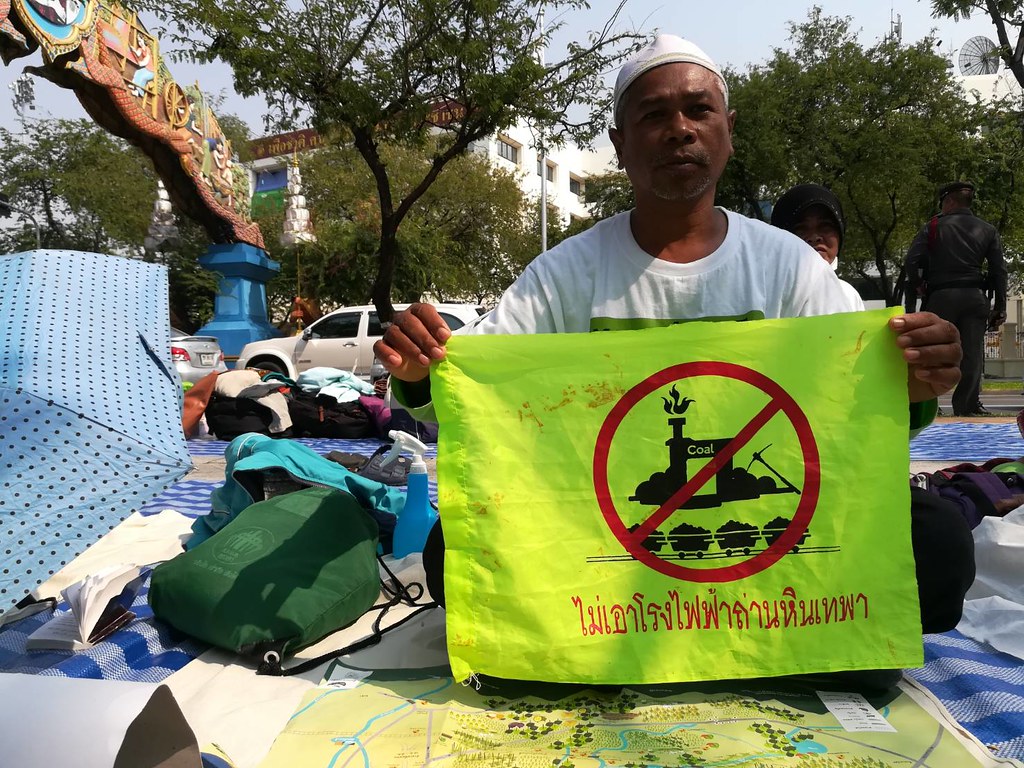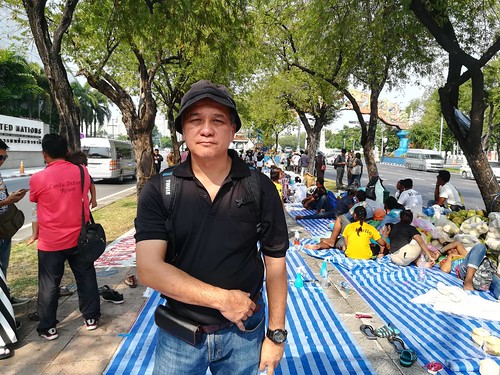The Ministry of Energy and anti-coal protesters have reached an agreement to temporarily halt plans to build two power plants in Krabi and Songkhla. All lawsuits between the two parties will also be terminated.
After staging a rally in Bangkok for almost a month, on 20 February 2018, the Southern Anti-Coal Network claimed victory after the Ministry agreed to a memorandum of understanding (MOU) to postpone building power plants in the southern provinces of Songkhla and Krabi.
The MOU states that the Electric Generating Authority of Thailand (EGAT) has to redo the Environment and Health Impact Assessments (EHIAs) of both projects. The assessments must be carried out by neutral experts, approved by both parties.
The agreement also states that before the EHIA process, the Energy Ministry has to assess whether Krabi Province and Thepha District, Songkhla, are suitable for coal-fired power plants. If the report finds the power plants unnecessary, EGAT must terminate the projects.
Lastly, all lawsuits between EGAT and the Network must be terminated.
After signing the MOU, the protesters cancelled their plan to march to Government House and returned home.

The signing ceremony of the MOU (Photo from Facebook)
Mustarseedeen Waba, a co-leader of the Network of People from Songkhla-Pattani against the Coal Power Plants, and Save Andaman from Coal, told Prachatai that the Network would wait and see if the authorities follow the agreement. “If the authorities do not follow the agreement within nine months, we will come back.” He added that he is not sure if the agreement on the termination of all lawsuits between EGAT and the activists includes the case against 17 activists, including Mustarseedeen himself, since the case is now before the court. Songkhla Court has scheduled a preliminary hearing on 12 March 2018.
On Monday 27 November 2017, Mustarseedeen and around 100 villagers from Thepha District joined a march to submit a petition to the junta leader Gen Prayut Chan-o-cha, who was visiting the region. The Royal Thai Police, with support from the local military, intervened in the demonstration and arrested 17 men, including a local journalist and a 16-year-old. The activists have been accused of joining the protest against plans to build a coal-fired power plant in Thepha. They were charged with resisting arrest, injuring state authorities, obstructing traffic, carrying weapons in public and violating the Public Assembly Act.
The protest in Bangkok was organised by the Network of People from Songkhla-Pattani against the Coal Power Plants and Save Andaman from Coal. The rally started on 29 January when protesters from Thepha gathered at the Government House, and Krabi villagers joined the movement on 8 February.
A day later, the police issued an order forcing the protesters to disperse, so they moved to the UN Building on 12 February and staged a mass hunger strike. 68 protesters joined the strike, and 10 of them collapsed and were admitted to hospital.
The protesters had to withstand not only starvation and pollution in Bangkok but also intimidation by the authorities. Last Wednesday, the Civil Court summoned two protesters, Somyos Tohlang and Jindarat Permlarpwirun, for violating Article 16(1) of the Public Assembly Act by obstructing footpaths and public roads.
In the end, they are now returning home with a victory and relief that their local environment will be safe, at least for now.
“Nobody wants to come here”
Leaving the fresh air in Southern Thailand to face severe pollution in Bangkok seems to be an unreasonable choice, given the recent PM2.5 crisis. However, these protesters have had to do this as they do not want their offspring living in a dusty hometown.
Supaporn Tawan, 30, a protestor from Krabi told the press that nobody wanted to be sleeping on the concrete with no shade or shelter, being bitten by mosquitoes and breathing polluted air. But the biggest difficulty is having no toilet facilities since Nanglerng Police Station had ignored their requests.
“We’re not well-educated. We’ve worked all our lives to provide our children with an education. But without the sea, we have no place to work. We can’t live, and we can’t make a living. So what’ll be left for our generations to come?” Supaporn said.
Ayob Musae from Songkhla, who lives 5 kilometres away from the proposed site of a power plant, said he had travelled on foot in an attempt to submit a letter to Prime Minister and NCPO leader Gen Prayut Chan-o-cha back on November 27 last year. He was arrested by the security officials that were ordered to control the walk.

Ayob Musae
He also participated in the hunger strike and reported some dizziness as a result of his fast. Ayob explained that he joined the protest as the power plant posed drastic threats to their health and the environment.
“Thepha District is a bay surrounded by mountains. If the wind blows in from the sea, it will cover the whole district. If it rains, there will definitely be an impact because when the wind blows, it blows into the shore,” said Ayob, adding that his community had been torn apart over the coal plant construction project.
“When the project came in, it caused division between those who support it and those who don’t support it. One day, the fishing boat of a supporter had caught a boatload of fish and was asking for help. It seems the boat went down because the group who do not support the project did not go to help. The community is torn apart. The government officials, village heads, and imam mostly are on the supporters’ side,” he added.
President of the Koh Lanta Tourism Association Therapot Kasirawat said that he was suspicious of the government’s insistence on building the plants despite the results of numerous impact studies. He added that the plants would cripple economic growth from tourism in the Andaman Sea provinces.
"The potential of Krabi, Phang Nga, and Phuket is one that is clear to see as the three provinces contribute to over 30 percent of the country’s tourism revenue and can still generate more. The potential of Krabi, Phang Nga, Trang and Phuket can be even greater. But if they are ruined, it will be like the eastern region with industrial estates near tourist destinations. Today, the only thing the eastern region has is man-made tourism, which would be the complete and irreparable destruction of the opportunities of the people who are the owners of the area’s resources,” Therapot stated.

Therapot Kasirawat
Additional reporting by volunteer reporter Pantharee Sujitvarong






